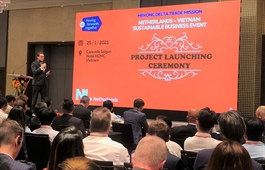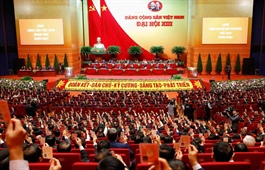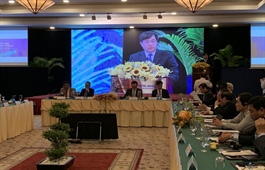Incentives for US and Vietnam to prosper together
Incentives for US and Vietnam to prosper together
Last year was unusual and turbulent, with devastating losses for millions of people but also positive experiences for others, including growth and unexpected success for some key businesses, industries, and sectors.

By Adam Sitkoff - Executive director American Chamber of Commerce in Hanoi
|
Amid the hardships, fear, and sadness, we have been buoyed by those who give us hope, from ordinary people engaging in unexpected acts of generosity and kindness to many of our member companies that stepped up to support the community in Vietnam. We thank Vietnam’s leadership for taking serious and appropriate steps to mitigate the damage from the terrible virus. While the future is unknowable, the government and the people of Vietnam have done an outstanding job.
Last year was a challenging one but the United States and Vietnam worked together in a respectful and cooperative way to resolve some important trade issues. And now, as we prepare for the Year of the Buffalo, the US-Vietnam relationship is solid and is growing stronger on a daily basis.
The Trump administration said that although Vietnam’s currency practices hurt American businesses, it decided not to impose tariffs or other trade restrictions that would harm the commercial relationship between our two countries. The administration had been investigating Vietnam’s policies and practices related to currency valuation since October. It was the first case in which the US cited currency manipulation as a reason to investigate a trading partner under Section 301 of the US Trade Act of 1974 – the same legal tool the White House used to impose massive tariffs on imports from China.
Throughout the investigation, we forcefully argued that the US and Vietnam have developed a healthy commercial relationship and that growth in the US-Vietnam trade deficit has been driven primarily by the relocation of supply chain security and sourcing operations from China to Vietnam, not by unfair actions taken by the State Bank of Vietnam.
We explained to the Trump administration that currency manipulation has not been an issue for our members, and that we prefer the US government to instead prioritise efforts on more pressing issues facing our business community such as discriminatory policies on digital trade and broadcast, pharmaceutical imports, intellectual property rights, customs and tax procedures, and more.
We urged President Trump’s team to resolve issues with Vietnam by negotiation and not by resorting to duties, tariffs, or other harmful trade barriers. Feedback and pressure from the business community made a huge difference in the outcome of this case. That is why our members place great importance on engagement with both governments. We believe that robust dialogue between the private sector and government helps lead to optimal public policy outcomes. Most importantly, our business community strongly believes that both countries can prosper together.
President Biden is now in office and we expect his trade policy to focus on helping US workers. It is critical that US companies and investors here encounter an equal, level, and predictable playing field as a solid foundation, not only to attract new investment, but also to maintain and grow the investment that is already here.
In addition, we recommend that foreign investment limitations, an overly restrictive legal framework of laws, and burdensome administrative procedures should be carefully reviewed and selectively relaxed to encourage increased US investment. In our view, by opening its market to more US goods and services, Vietnam can help to rectify the growing trade imbalance between the two countries in a manner that benefits both countries.
As major investors here, US companies have an interest in Vietnam’s continued success. It is a new year and we welcome the incoming leaders in both countries. US investors are optimistic about business prospects in Vietnam, and we support efforts to create a modern economy that will attract future investment and high-paying jobs for Vietnamese people. We will continue to work on lowering barriers to trade, to help the Vietnamese government make it easier to do business, and to create a high-standard, transparent, and stable business environment to ensure that all investors have fair access to that opportunity.



























